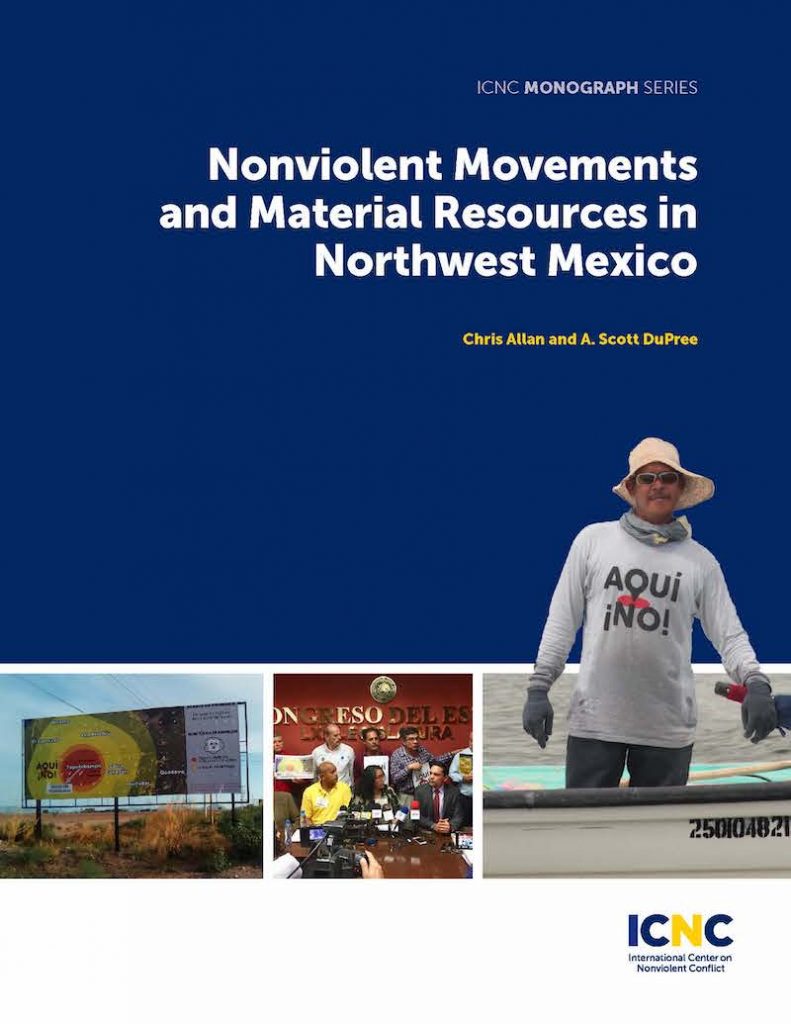By: Chris Allan and Scott DuPree
Date of Publication: June 2021
Free Download
Purchase a Print Copy
Purchase an e-book (Nook | Kindle)
Description:
 Nonviolent resistance movements operate with few resources and nearly no money. Yet these movements thrive and often succeed. The little external funding for civil society that is available rarely reaches the grassroots groups that are the backbone of these movements. How do they get the material resources they need? This study highlights strategies that are being used effectively by nonviolent movements to mobilize the resources they need to galvanize participation in movement actions and influence both the public and policymakers. Based on the experience of three campaigns in Northwest Mexico over two decades, the research finds that material resources are often mobilized internally in a decentralized way, driven by effective strategic planning and actions. We discuss the strategic choices nonviolent movements make to mobilize resources and how they direct them as situations change, and how outside supporters can provide resources in a constructive way.
Nonviolent resistance movements operate with few resources and nearly no money. Yet these movements thrive and often succeed. The little external funding for civil society that is available rarely reaches the grassroots groups that are the backbone of these movements. How do they get the material resources they need? This study highlights strategies that are being used effectively by nonviolent movements to mobilize the resources they need to galvanize participation in movement actions and influence both the public and policymakers. Based on the experience of three campaigns in Northwest Mexico over two decades, the research finds that material resources are often mobilized internally in a decentralized way, driven by effective strategic planning and actions. We discuss the strategic choices nonviolent movements make to mobilize resources and how they direct them as situations change, and how outside supporters can provide resources in a constructive way.
About the Authors:
 Chris Allan, from Ajabu Advisors, has 30 years of experience working in social change, including designing, planning, implementing, and evaluating programmes around the globe. In the environmental justice field, he has organised and funded grassroots groups, national coalitions, and global alliances working on public participation in decision making about a wide range of environmental justice issues.
Chris Allan, from Ajabu Advisors, has 30 years of experience working in social change, including designing, planning, implementing, and evaluating programmes around the globe. In the environmental justice field, he has organised and funded grassroots groups, national coalitions, and global alliances working on public participation in decision making about a wide range of environmental justice issues.
He has experience with designing, managing leading, and/or participating in evaluations in Kenya, Lesotho, Namibia, Rwanda, Tanzania, and Zimbabwe. He has also managed studies in Brazil and Central America, and a comparative study of environmental work at community and policy level in Ghana and Peru. He has a Master’s Degree in Social Change and Development from the Johns Hopkins University School of Advanced International Studies in Washington, DC, and a Bachelor’s Degree in Biology and African Studies from Wesleyan University. More information is available here.
 A. Scott DuPree, a researcher and consultant for social movement support organizations, has worked in Mexico, Brazil, Southern Africa, Southeast Asia, and the United States. His interest in the power of social movements has led him to work with organizations that provide support to grassroots organizations moving forward initiatives related to social justice, human rights and the environment.
A. Scott DuPree, a researcher and consultant for social movement support organizations, has worked in Mexico, Brazil, Southern Africa, Southeast Asia, and the United States. His interest in the power of social movements has led him to work with organizations that provide support to grassroots organizations moving forward initiatives related to social justice, human rights and the environment.
Scott has directed initiatives at the Synergos Institute (New York City), Conectas Human Rights (Sao Paulo, Brazil) and Global Greengrants Fund (Colorado). His Ph.D. from the Josef Korbel School for International Studies researched people’s power in Zimbabwe. He teaches master’s level and undergraduate courses on participatory development, movements and human rights at Regis University, University of Colorado Denver, and the Korbel School at the University of Denver.